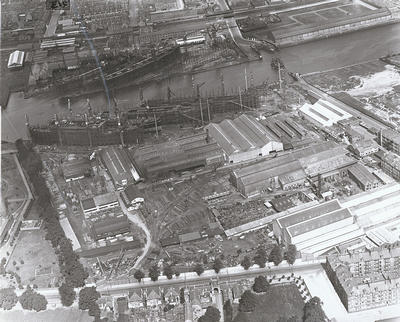
An aerial view from the south Alexander Stephen & Sons' Linthouse Shipyard. The River Clyde, Whiteinch Ferry and Barclay, Curle & Co's Clydeholm Shipyard are in the background.
Alexander Stephen purchased the Linthouse estate to the west of Govan in 1869 and built a shipyard. The first ship was launched there in 1870 and the yard's engine and boiler works were completed the following year. Stephen's built houses nearby for 120 men and their families.
Stephen's became famous for cargo and passenger liners and for a lucrative sideline in banana boats. The firm's name had a less happy association with the Daphne disaster of 1883, when a steamer capsized after its launch from the yard and 124 workers lost their lives. During the First World War, Stephen's continued to build merchant ships as well as torpedo boats and destroyers for the Royal Navy. The firm provided sport and leisure facilities for its workforce, opening the forerunner of the Stephen Apprentices Boys Club in 1917, and laying out Coila Park in 1920 for workmen and their families.
Reference: P551
Reproduced with the permission of Glasgow City Council, Libraries Information and Learning
Keywords:
aerial views, Alexander Stephen & Sons, banana boats, Barclay, Curle & Co, Clydeholm Shipyard, Coila Park, Daphne, destroyers, disasters, ferries, First World War, liners, Linthouse Shipyard, marine engineering, parks, River Clyde, Royal Navy, shipbuilders, shipbuilding, ships, shipyards, Stephen Apprentices Boys Club, torpedo boats, Whiteinch Ferry
You have 0 images in your photo album.